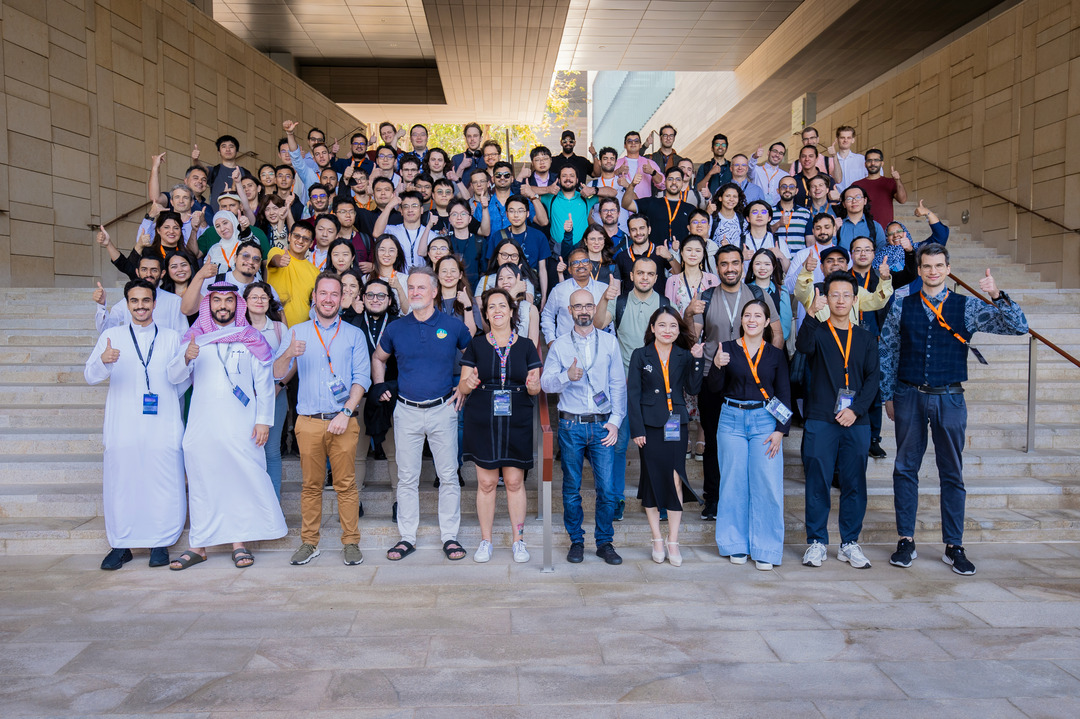Rising stars, global impact: Saudi Arabia at forefront of AI innovation

Participants of the 2025 KAUST Rising Stars in AI Symposium came together to collaborate, exchange ideas and share their passion for advancing the future of artificial intelligence.
King Abdullah University of Science and Technology (KAUST) is helping define Saudi Arabia’s essential role in the critical domain of artificial intelligence — a mission exemplified by the Rising Stars in AI Symposium 2025. By convening the world’s brightest early-career minds for creative dialogue, sparking new ideas and collaborations, the University has reinforced its position as a hub for transformative AI research in the Kingdom and beyond.
“At KAUST, we are deeply committed to building an environment where ideas flourish, discoveries emerge, and impact is achieved. We’re about long-term support of outstanding people,” KAUST President Sir Edward Byrne AC told the symposium. “The relationships that began here between future colleagues, research partners and mentors will play some role in shaping individual careers — and possibly the trajectory of AI globally.”
Organized by the Center of Excellence for Generative AI, the symposium’s fourth edition, April 7-10, provided a platform for 25 emerging researchers — Ph.D. students, postdoctoral fellows and junior faculty — to present their work recently accepted at top-tier AI conferences, including the Conference on Neural Information Processing Systems, the International Conference on Machine Learning, and the Conference on Computer Vision and Pattern Recognition.
“These rising stars come to KAUST because they know we’re a serious player in the AI research community,” said Professor Bernard Ghanem, Chair of the Center. He emphasized the symposium’s strategic value for KAUST’s own AI talent, who used the event to highlight their pioneering research in generative AI, machine learning, and computer vision, as well as natural language processing. “It’s an opportunity for knowledge transfer, brainstorming and collaborations.”
For example, from Professor Jürgen Schmidhuber’s research group, Ph.D. candidates and postdoctoral researchers presented projects ranging from the use of AI to accelerate material discovery (notably for climate-related applications) to autonomous AI systems that learn without external feedback, frameworks that build collaborative agent ecosystems, and novel methods for generating and understanding complex media.
This high-profile symposium reflects KAUST’s ambition to advance scientific excellence and global collaboration, noted Sir Edward. He described AI as a defining pillar of modern progress and underscored KAUST’s commitment to developing expertise essential for long-term innovation and a dynamic, inclusive research ecosystem. He added that the University serves both as a launchpad for breakthrough ideas and a catalyst for transformative change.
According to Ghanem, the symposium was also a tool to recruit KAUST researchers and faculty, with examples of it having done so in previous editions. He said this pivotal event reinforces the University’s role as a global stimulus for AI innovation. “It brings people here to witness KAUST as a beacon of research worldwide, and that’s crucial.”
Valuable interactions
For participants, “Rising Stars” facilitated an exceptional exchange of ideas. Xinyin Ma, a National University of Singapore Ph.D. student presenting on efficient structural compression for diffusion models, said along with offering a firsthand look at KAUST’s unique world-class research facilities, the symposium also connected her with some of the AI field’s top minds — both from KAUST and around the world. “That collaboration was very meaningful.”
Likewise, Dr. Vijay Prakash Dwivedi, a Stanford University postdoctoral researcher presenting on transformers for graph structural data, said the symposium was an invaluable experience for him to engage with brilliant colleagues, to explore potential collaborations, and to empirically observe KAUST’s vision and capabilities. “I heard about KAUST before, but this was an opportunity for me to go and explore it for myself in person.”
The symposium also enabled KAUST researchers to showcase recently published AI work to global peers during poster sessions. Dr. Andrés Villa, a postdoctoral fellow in the Image and Video Understanding Lab, shared his team’s work on making instructional AI systems more accurate and reliable when interpreting visual information. He said his symposium conversations directly benefited his research. “It was valuable interacting with different perspectives.”
Future opportunities
While KAUST’s Center of Excellence for Generative AI only launched in September 2024, many of its leaders — including Ghanem and co-Chair Schmidhuber — were behind the Rising Stars in AI Symposium from its first edition. Ghanem explained that the symposium’s growing reputation aligns with the Center’s mission: to place Saudi Arabia at the forefront of AI research regionally and globally.
Professor Gianluca Setti, Dean of the Computer, Electrical and Mathematical Sciences and Engineering (CEMSE) Division at KAUST, highlighted the Kingdom’s rapid and transformative growth in AI. He stressed Saudi Arabia’s global leadership in advancing women’s empowerment and job creation within the AI sector, emphasizing the pivotal role of KAUST and its Generative AI Center in these achievements.
Addressing the “Rising Stars” participants, he encouraged them to remain connected with KAUST as their careers evolve, stating: “This event showcases the strength of emerging AI talent and embodies the spirit of innovation that defines our mission at KAUST.”
The symposium concluded with KAUST signing a memorandum of understanding regarding research collaboration with Tawuniya, which is the largest insurance company in the Middle East and North Africa. This year’s event marked its expansion to include industry partners from across the Kingdom.
Ghanem added: “This symposium is not going to be our last. Our goal is to grow and expand it in the years ahead. With strong interest from partners — and with clear benefits for Saudi Arabia and our collaborators — we’re seeing a shared commitment to making this an even more prominent flagship event.”

